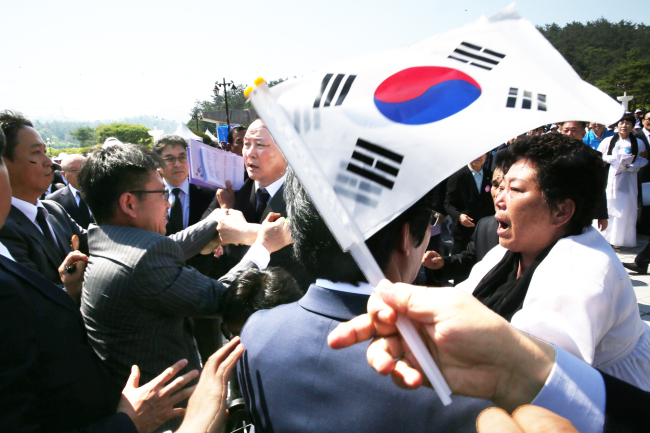Prime Minister Hwang Kyo-ahn -- flanked by presidential secretary Hyun Ki-hwan and other government officials -- looked uncomfortable as he stayed silent while other participants sang “March for Our Beloved” at Wednesday’s commemoration of the Gwangju Uprising.
The scene was symbolic of the political divide and social disputes that still remain in Korea over what is internationally recognized as a civilian revolt against the dictatorial military regime, 36 years after the bloody incident.
The scene was symbolic of the political divide and social disputes that still remain in Korea over what is internationally recognized as a civilian revolt against the dictatorial military regime, 36 years after the bloody incident.

In 1979, the abrupt assassination of iron-fisted leader Park Chung-hee -- incumbent President Park Geun-hye’s father -- left the nation in hopes of bringing democracy at last.
Such hopes were quickly dashed in December, after Gen. Chun Doo-hwan took over the government through a military coup.
The disgruntled public in Gwangju rose against the military regime at Chonnam National University on May 18, 1980, only to be mowed down by the military in the days to come. To this day, the number of civilian casualties remains uncertain, ranging from the stated 144 by the then-martial law command to the media estimates of over 1,000.
The military regime’s attempt to frame the May 18 Democratic Uprising as a rebellion initiated by the North Korean troops and their sympathizers was all but debunked, with foreign journalists like the late Jurgen Hinzpeter reporting and civilian groups working to unearth facts related to the movement.
In 2011, the 1980 Archives for the May 18th Democratic Uprising was inscribed on the UNESCO Memory of the World Register.
But the “North Korean intervention” conspiracy lingers on in Korea via civic groups, the Internet and even mainstream media.
In 2013, local cable broadcasters TV Chosun and Channel A drew fire for interviewing North Korean defectors and ultra-right panels who claimed the Gwangju Uprising was sparked by North Korean troops, without presenting actual evidence.
The Korea Communications Standards Commission subsequently issued a warning and disciplinary actions against those involved, saying airing uncensored, baseless claims are a violation of the regulation.
“A disciplinary action is inevitable as gross distortion of a historical fact that has been proven both legally and socially can infringe upon the assessment of the meaning behind the May 19 Uprising,” the commission said.
Last month, columnist Jee Man-won was indicted on a charge of claiming that a citizen who participated in the May Uprising was a member of the North Korean special forces team.
Those who believe North Korea interfered in the 1980 incident are in the minority. Last week’s survey by the May 18 Memorial Foundation on those 19 years of age and older showed that 9.6 percent of the respondents believed the uprising was related to Pyongyang.
Experts say the root of the distortion comes from the claims of the Chun regime.
Lee Yun-seop, the author of the book “1980 Korea,” quoted a May 1980 report by the South Korean Army that analyzed intel that North Korea was planning to invade the South around May 15-20, when the “disturbance” was at its peak. The report said there was very little possibility of an invasion, given that Pyongyang’s then-leader Kim Il-sung was visiting Yugoslavia at the time, and that there were no signs of imminent war.
Ironically, Chun -- the man believed to be primarily responsible for the violent suppression of the protestors -- said in a recent interview he had received no reports of the North Korean troops invading Gwangju. During the interview, he also ducked responsibility for the Army’s shooting of protesters.
Oh Seung-yong, a research professor at Chonnam National University’s May 18 Institute, recently released a paper pinpointing the military regime as the source of conspiracy theories relating to May 18.
“The distortion theories currently being advocated by the conservatives are merely adding details to the claims made by the martial law command,” he said in the paper.
Oh contended that it is the ultraconservatives that spread faulty rumors on the May 18 Uprising, saying it is because they feel threatened by the surge of liberals, many of whom find political roots in the democratization movements in the 1980s.
Gwangju and the Jeolla provinces remain a very liberal region, with around 70-80 percent of citizens there voting for liberal candidates in each election.
With the Gwangju Uprising becoming a symbol for the liberal faction, the event itself is often embroiled in ideological and political disputes.
Singing of “March for Our Beloved” -- controversial for its lyrics written by a person suspected to be pro-North and later being used in a North Korean movie -- has been representative of the standoff.
Up to 2008, all attendees of the May 18 ceremony were required to sing the song. But it became optional in 2009, the second year of the conservative President Lee Myung-bak administration.
The Ministry of Patriots and Veterans Affairs, in charge of the ceremony, said it was to avoid “division of public opinion” from having everyone sing the controversial song.
By Yoon Min-sik
(minsikyoon@heraldcorp.com)



![[Exclusive] Korean military set to ban iPhones over 'security' concerns](http://res.heraldm.com/phpwas/restmb_idxmake.php?idx=644&simg=/content/image/2024/04/23/20240423050599_0.jpg&u=20240423183955)

![[Graphic News] 77% of young Koreans still financially dependent](http://res.heraldm.com/phpwas/restmb_idxmake.php?idx=644&simg=/content/image/2024/04/22/20240422050762_0.gif&u=)



![[Pressure points] Leggings in public: Fashion statement or social faux pas?](http://res.heraldm.com/phpwas/restmb_idxmake.php?idx=644&simg=/content/image/2024/04/23/20240423050669_0.jpg&u=)










